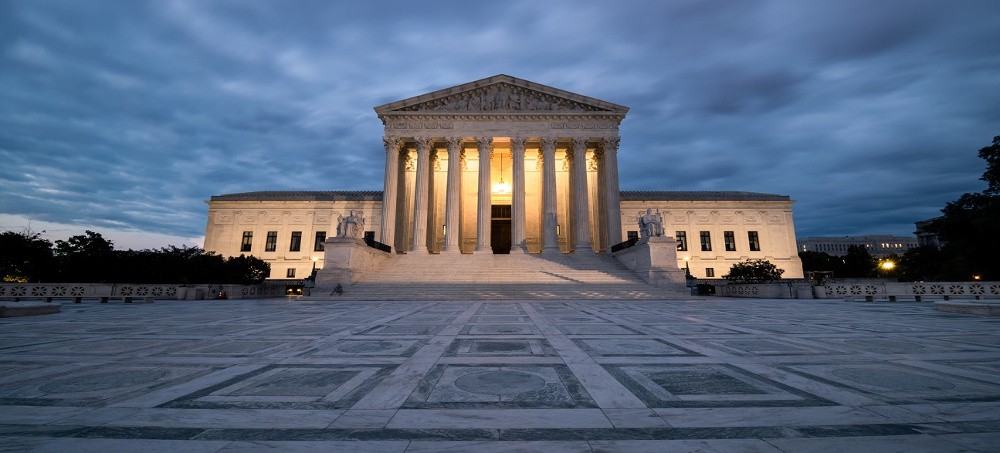Live on the homepage now!
Reader Supported News
The justices are vulnerable to public pressure in support of court reform. That’s why we must continue to push for change
This defeatist argument fails to recognize a pivotal audience who surely hears the growing public calls for urgent reform – the supreme court itself.
We need only look to the number of justices who have felt the need recently to speak up on behalf of the court, in an attempt to justify its egregious abuse of judicial norms and processes, to know the justices are listening.
Historically, one of the most common features of supreme court justices is their public silence when away from the court. They generally let their decisions speak for themselves. No longer is that tenable as this court’s conservative supermajority insists on using its power to advance a partisan agenda at the expense of our constitutional rights and democratic legitimacy.
Most recently, Justice Samuel Alito gave a speech at the University of Notre Dame that can only be described as an attempted takedown of the press. In his remarks, Justice Alito lambasted the work of journalists and even criticized the press for using the term “shadow docket”, a term coined by a conservative law professor. All Justice Alito succeeded in doing, however, is proving his sensitivity to the public discourse about the court.
It’s not just justices who are attempting to justify the court’s break from judicial norms and disregard for constitutional rights. Senator Chuck Grassley, for instance, has even taken it upon himself to defend the court from what he perceives as bullying. His implication, however, that the court should be beyond reproach is to suggest the public ought to sit idly by while our rights are systematically dismantled for partisan gain.
Justices, and politicians, can proclaim that the court is not political or that the public’s waning approval of the institution is a product of the media, but nobody is forcing the court to deface its own norms and precedents.
Nobody is forcing this conservative supermajority to use the shadow docket to rewrite American jurisprudence. Pregnant people in Texas no longer have a constitutional right to abortion because five justices on the supreme court opted to nullify Roe v Wade by way of the shadow docket.
Nobody is forcing this supermajority to discard the court’s own precedent, even precedent that was written by some of these same justices. Whether you look at the court’s nullification of Roe v Wade in Texas, its reversal on questions of due process for Guantánamo Bay detainees, or the court’s 180-degree turn on juvenile sentencing, this conservative supermajority has made clear that precedent be damned.
By way of example, Justice Sonia Sotomayor wrote in her dissent in the recent Jones v Mississippi case that the majority decision distorted the court’s previous decisions in Miller v Alabama and Montgomery v Louisiana “beyond recognition” in order to “justify” reimposing juvenile life without parole. The court rejected its own decisions in cases decided just nine and five years ago respectively. When precedent is so blatantly ignored, it is difficult to explain the court’s change in direction but for politics.
Nobody is forcing the court to willfully ignore the racially disparate impact of voter suppression laws, pretending that the election of one non-white president means people of color have equal access to the ballot box despite all evidence to the contrary. Our right to self-government, achieved through a meaningful right to vote, is in serious jeopardy because this court continues to turn a blind eye.
Nobody forced Justice Amy Coney Barrett to speak at an event hosted by Senator Mitch McConnell, the very senator responsible for jamming her confirmation through the Senate while a presidential election was under way. At this event, Justice Barrett was proudly introduced by Senator McConnell, and then quickly stated that her goal was to convince the audience that the justices are not just “political hacks”.
Such a claim of ethical clarity just isn’t credible when it is uttered on stage right next to the person most responsible for the partisan gamesmanship that packed the court. What Justice Barrett did succeed in doing with her remarks is to confirm just how closely justices listen to the public narrative about the court – and how sensitive they are to it.
The justices, through their own actions and words, have demonstrated their vulnerability to public pressure in support of court reform. Turns out, justices do not like being told they have no clothes on.
As the court delves into its new term, it should have no doubt that all eyes will be upon it. If they want to escape it, rather than hoping the press will be cowed into submission, the justices of the court might consider fulfilling the mission of the institution they embody, by upholding constitutional rights and respecting judicial norms.
Follow us on facebook and twitter!
PO Box 2043 / Citrus Heights, CA 95611



No comments:
Post a Comment